Vegan frangipane – who would have thought?! This simple vegan frangipane tart is a perfect, plant-based twist on the classic but without all the dairy and eggs!
In this recipe I’ve done a really simple poached pear but feel free to get crazy with it! Add some spices, wine, or anything else you want to zhuzh up this delicious tart.
Let’s talk about the CRUST! Skip the end of these recipe notes for a photo tutorial. This is my go-to flaky crust recipe for most pies, tarts, etc.! The vinegar is there for that extra level of flakiness as it will evaporate in the oven and leave you with a delicate, buttery crumb. It’s a little bit of fuss but I wanted the crust to be as indistinguishable from a non-vegan crust as possible and to be comparable to a quality pastry shop pie. If you’re curious about my other pie recipes then click here to look through my pie archive!
If you’re trying to save time there are plenty of shop-bought crusts available (at least in the UK/Europe), such as this Jus-rol short crust pastry that is naturally vegan! Alternatively you could try any other simpler crust recipe found online but just remember that the pie has to be baked for an extra 30 minutes with the filling inside so “raw” or crumbly crusts won’t work.

Let’s talk about the filling!! Most of the ingredients are self-explanatory but I’ll discuss a few of the key ones. The main thickening agent of this recipe is the cornstarch (or cornflour in the UK). This ingredient is super important to this recipe so make sure you buy cornstarch and not corn flour or corn meal or any other variant. If you can’t find cornstarch you can also use arrowroot starch. They key to a good vegan frangipane tart is not overcooking those poached pears so lean on the side of cautious when poaching!
My go-to quality vegan butter is the “vegan block” by Naturli (based in the UK) that I would thoroughly recommend for desserts and bakes where the quality of the butter is important!
Now onto the full vegan frangipane tart recipe!!

Vegan Pate Sucrée (Sweet Shortcrust) tutorial:
Sieve together the flour, sugar and salt in a mixing bowl. Add chilled, chopped butter to the bowl.
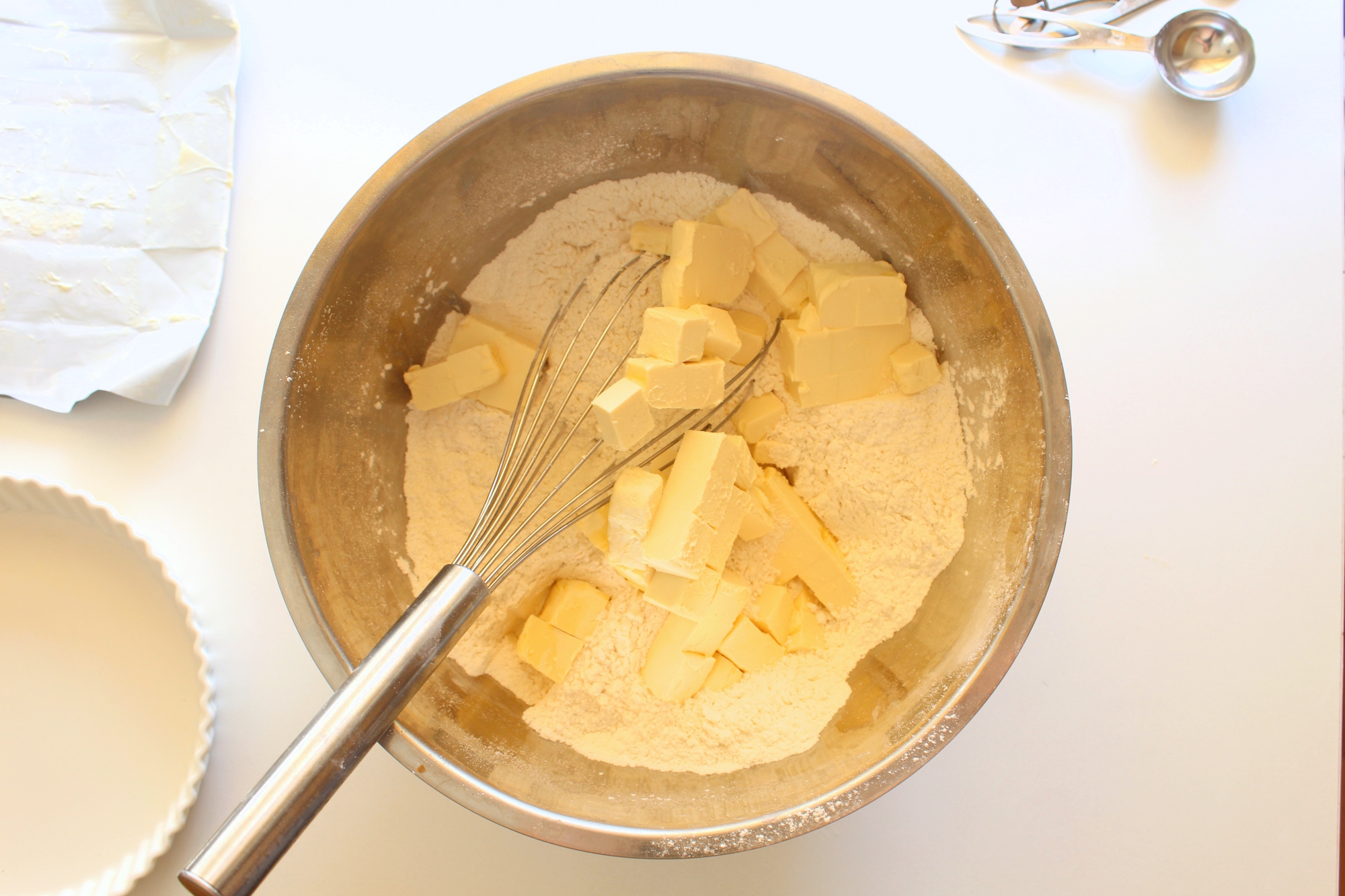
Using a cold metal whisk, mix together the butter and flour until it resembles bread crumbs. Do not take too long as we don’t want the butter to melt into the flour. Chunks will stick the whisk but persevere through the exercise and with some elbow grease you’ll eventually get there!
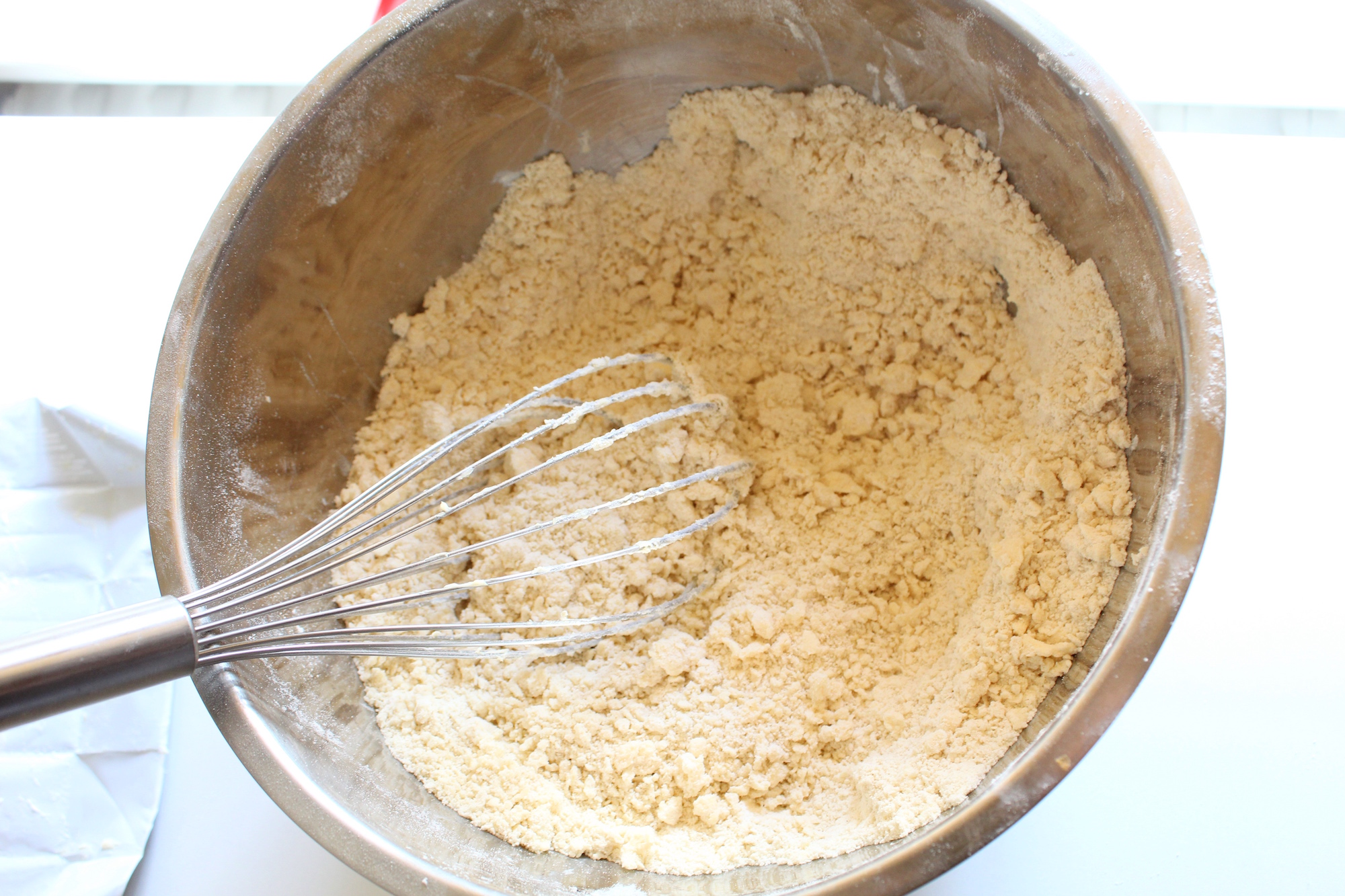
Add the ice cold water and vinegar to the mixture and mix together with a wooden spoon until the mixture is completely homogenous and comes together in ball. Try not to handle the pastry too much.
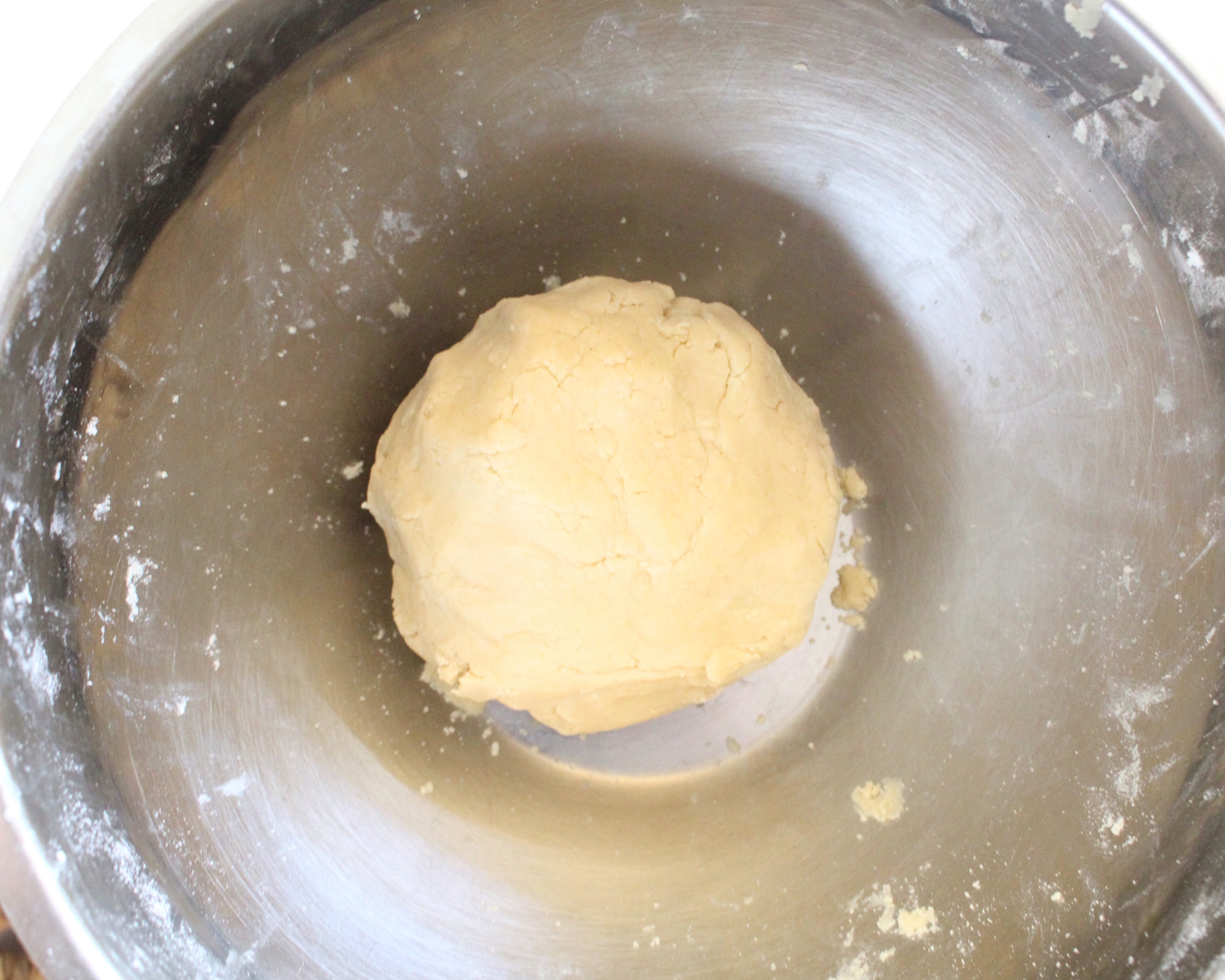
Wrap the pastry in clingfilm or foil and chill for 30 minutes. Meanwhile, flour a clean surface with flour and get your rolling pin ready!
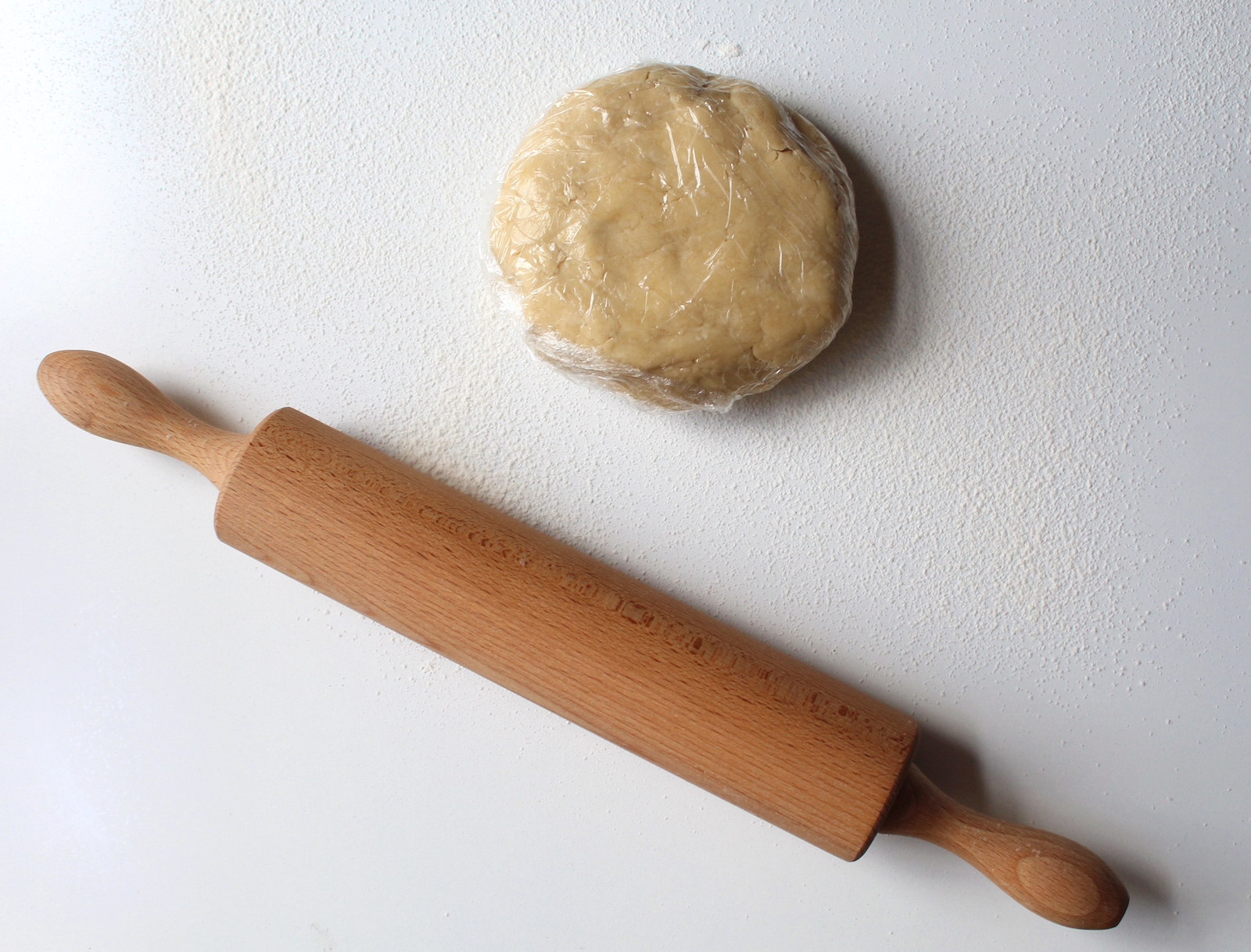
Take the pastry out of the fridge and start beating it with the rolling pin to loosen it up. Try to avoid causing large cracks in the pastry. If it is cracking too quickly it may be too cold – wait 3-5 minutes for it to soften slightly. Now roll out the pastry to 3mm thick. The best way to roll it out is to roll across the whole disk with the rolling pin and then rotate it 45° and roll again once. This way the whole pastry should be one even layer.
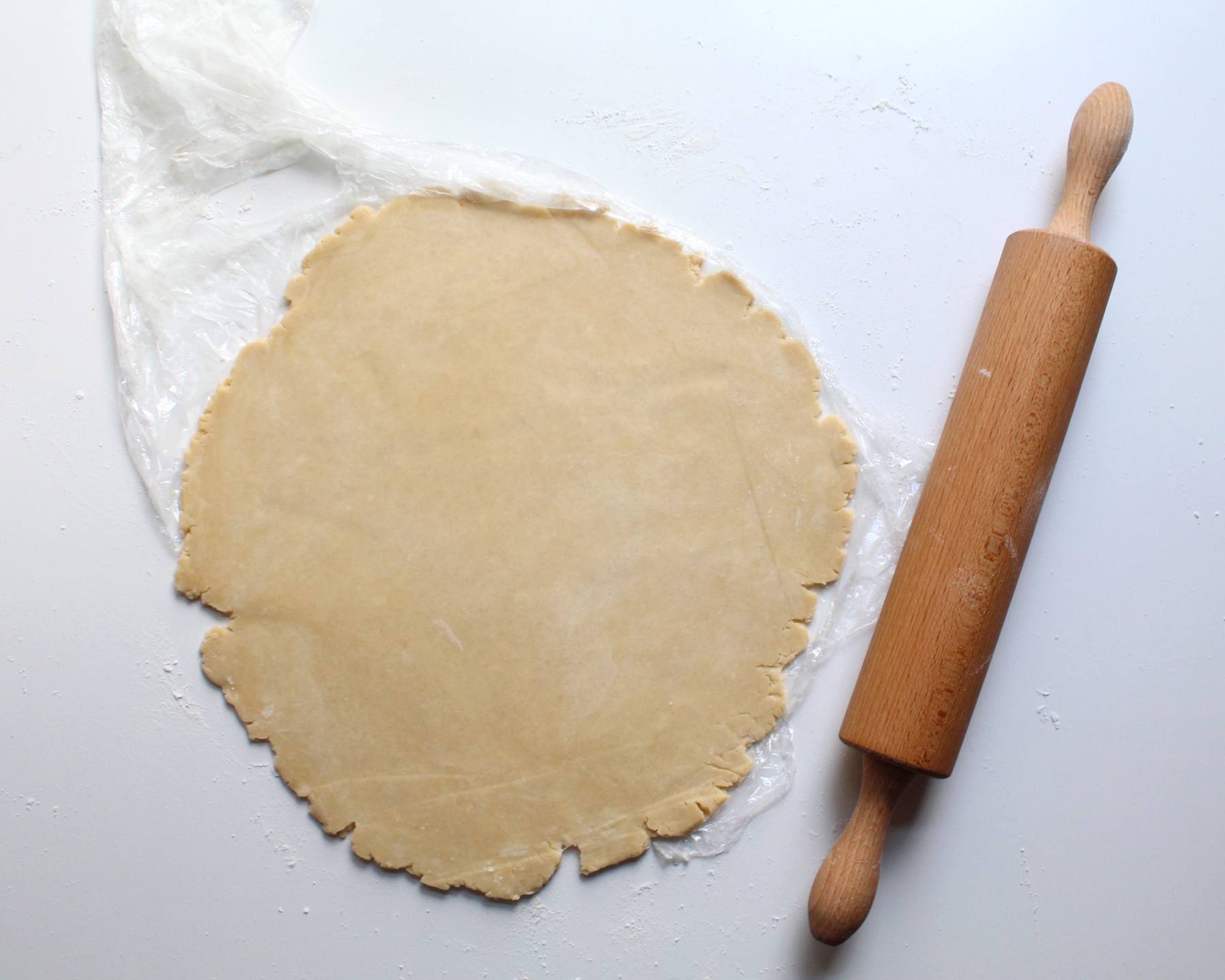
Once the pastry is thin enough, flop the pastry over the rolling pin and place it into your pie dish or flan tin. Gently push it down into all of the corners and use your thumbs to press the dough against the walls of the dish. Using a knife or pizza cutter, cut away any excess dough so you’re left with a clean 1.5 inch deep crust base.
Poke a few holes in the crust with a fork to prevent bubbles when baking. Cover this with clingfilm again and place back in the fridge for 20 minutes. Pre-heat the oven to 160C.
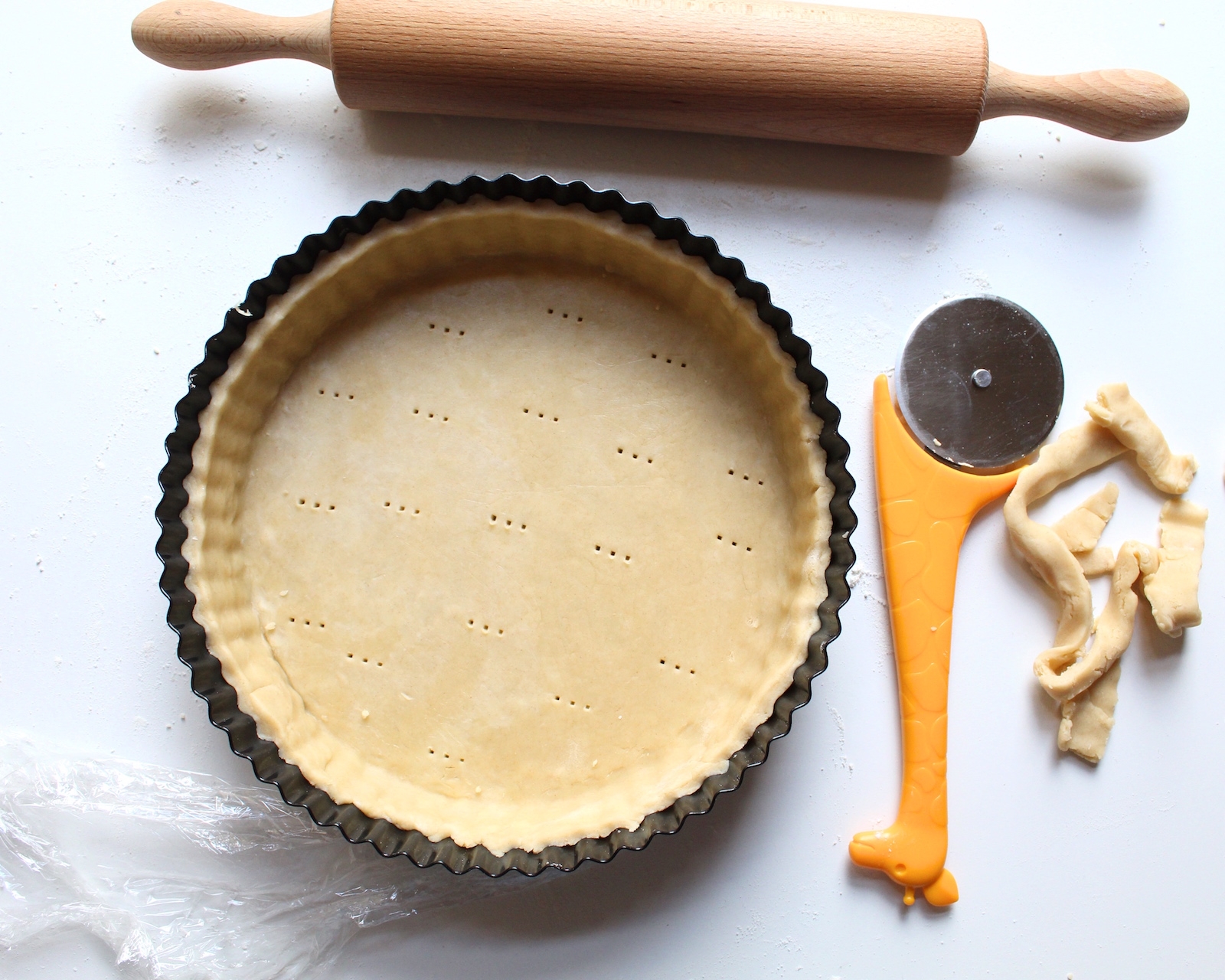
After 20 minutes, place a layer of parchment on top of the pie crust and weigh it down with baking beads. Bake for 20 minutes. After 20 minutes, take it out and remove the baking beads and parchment. Bake for a further 15 minutes until slightly golden. Do not allow the pastry to brown too much as we will be cooking it for a further 30 minutes with the frangipane filling shortly.
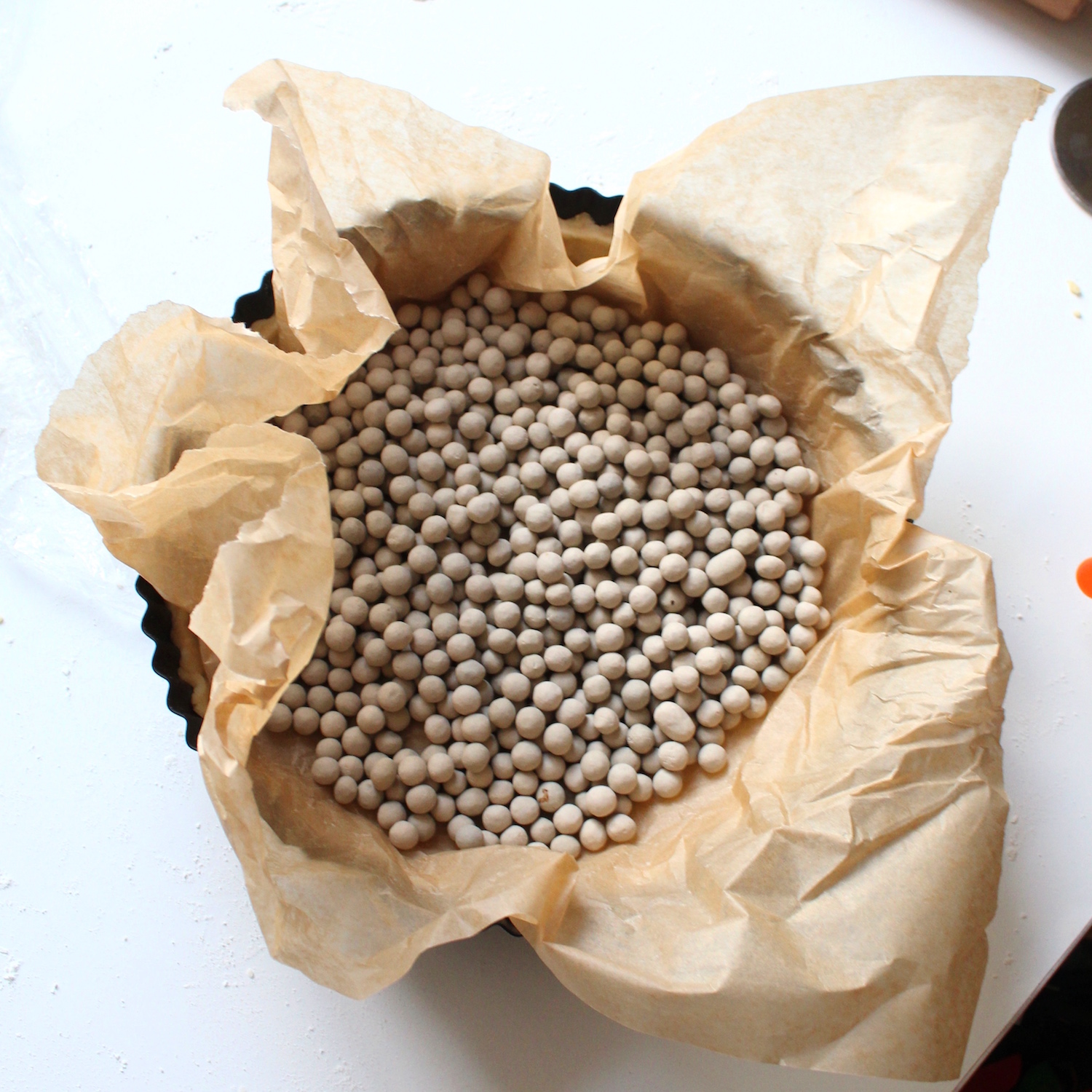
For this recipe you will need:
- 10 inch pie dish
- baking beads (or dry rice/lentils)
Onto the full vegan frangipane tart recipe!
Vegan Pear Frangipane Tart
This delicious pear frangipane tart is the dark horse of all showstoppers. What better way to impress a crowd than an elegant frangipane tart but completely plant-based!

Ingredients
- Crust:
- 240g plain flour plus extra for dusting
- 150g vegan butter (and extra for greasing)
- 1 tbsp cold water
- 40g icing sugar
- 1/2 tsp salt
- 1 tsp white wine vinegar
- Frangipane:
- 150g almond flour
- 30g white flour
- 1 tbsp cornstarch
- 60g vegetable oil
- 75ml aquafaba
- 100g caster sugar
- 1/2 tsp baking powder
- 1.5 tsp almond essence
- 2 tbsp almond milk
- ½ cup slices almonds
- Poached pears:
- 3 pears
- 300g caster sugar
- 1 litre water
Directions
- Step 1 Crust: Add flour and butter to a mixing bowl and mash together with a cold metal whisk until it is the consistency of breadcrumbs (you can use your hands but your body heat might start to melt the butter).
- Step 2 Add the water, white wine vinegar, salt and sugar and keep mixing/kneading until it is in a smooth ball of dough (do not over work). Wrap this in cling film and rest in the fridge for at least 30mins.
- Step 3 While you wait, set up the tart tin by greasing it with the extra margarine and then coat it in a dusting of flour (using a sieve). Shake of the excess.
- Step 4 Cover a clean surface with a dusting of flour and unwrap the pastry. Use a rolling pin to roll the pastry out to about 4mm thick.
- Step 5 Roll the pastry onto the rolling pin and drape over the tart case. Push the pastry into all corners of the case (delicately). Trim the edges and pre-heat the oven to 160C (325F).
- Step 6 Prick holes in the bottom of the pastry using a fork and then wrap case with cling film and rest in the fridge for another 20minutes.
- Step 7 Unwrap the pastry then get a piece of non-stick baking paper and put it on the pie crust. Weigh it down with ceramic baking beans/lentils/rice.
- Step 8 Bake in the over for 25 minutes. Remove the lentils/beans and then cook for another 15 mins (until it is lightly golden brown).
- Step 9 Poached pears: Peel the pears and cut them in half. Add the 300g of sugar to 1 L of water with the pears. Bring the water to a gentle boil and simmer for 20 minutes.
- Step 10 Remove the pears and dry them off. Allow them to cool and then delicately slice the pears ready for placing them on the frangipane.
- Step 11 Frangipane: In the bowl of a stand mixer fitted with the whisk attachment, whip the aquafaba until it is glossy and forms ribbons when spooned (about 10 minutes on high speed).
- Step 12 Add the sugar, oil and almond extract and whisk again briefly to combine. Remove the bowl and fold in the flour, baking powder, cornstarch and ground almonds until completely combined. The mix will be a very thick paste at this stage. Add the soy milk and mix to thin out the frangipane. Set aside.
- Step 13 Pour the frangipane mix into the tart shell. Place the sliced pears on top of the frangipane and gently push them into it.
- Step 14 Bake for 30 minutes or until the pie filling shakes like jelly (firm but with a little jiggle). If the edges begin to brown too quickly, cover them in foil. Take out the oven to cool for a couple hours.
- Step 15 Serve at room temperature.

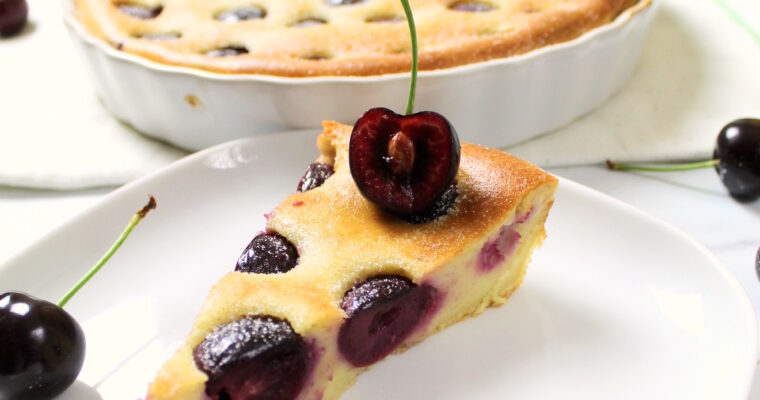

Thank you for creating this amazing recipe! I am so excited to try vegan frangipane. Aquafaba tends to upset my stomach, so I am wondering how crucial it is in this frangipane and if you have any substation recommendations? Thanks for your time!
Thank you for this, it came out perfect first time! Just as delicious as one from a French patisserie.
Very delicious! Served it as dessert at a dinner party and everyone was wowed! Will definitely make it again!
Awesome!! Thanks for commenting 🙂
Hi there!! I’m about to make your lively recipe and I was wondering about the icing sugar. Does it make a big difference if I use coconut or caste sugar? I’ve seen you using it in other recipes so I was just curious about the reason 🙂
On the aquafaba beating, does it need to be white are close to have peaks or far from that?
Thank you so much!!
Hi Paula! Sorry for the delay. You can absolutely use whichever sugar you like in the crust. Icing sugar just helps with a tender, melt-in-the-mouth texture. The aquafaba just had to get to a thick foam! It’s really only to add some lightness to the frangipane so as long as it’s light, foam and at least soft peaks it will be fine. All the best, Tom.